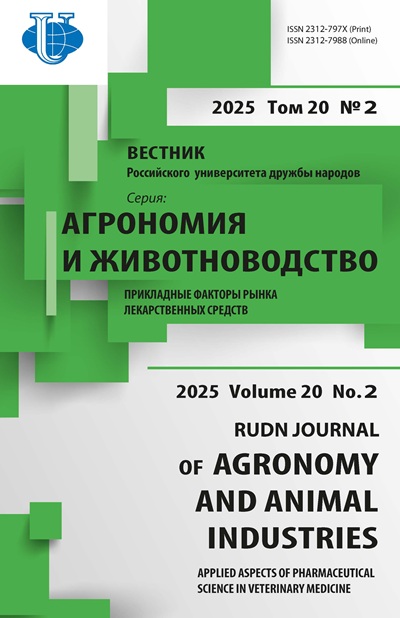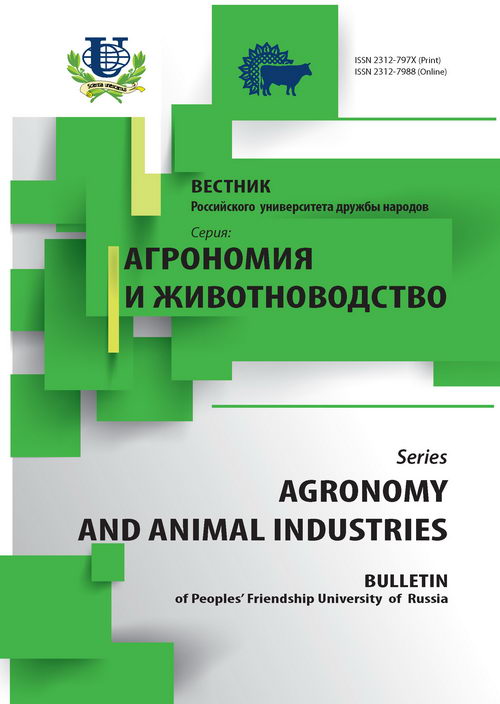Урожайность ярового ячменя на каштановой почве Нижнего Поволжья
- Авторы: Шуравилин А.В.1, Бородычёв В.В.2, Новиков А.Е.3, Поддубский А.А.1
-
Учреждения:
- Российский университет дружбы народов
- Волгоградский филиал ФГБНУ «Всероссийский научно-исследовательский институт гидротехники и мелиорации имени А.Н. Костякова»
- ФГБНУ «Всероссийский научно-исследовательский институт орошаемого земледелия»
- Выпуск: № 2 (2016)
- Страницы: 7-14
- Раздел: Статьи
- URL: https://agrojournal.rudn.ru/agronomy/article/view/1407
- DOI: https://doi.org/10.22363/2312-797X-2016-2-7-14
- ID: 1407
Цитировать
Полный текст
Аннотация
Приведены результаты мелкой (на 20-22 см) и относительно глубокой основной обработки почвы (27-30 см) и дифференцированного внесения по глубине пахотного горизонта доз минерального питания (N и P2O5) на урожайность ярового ячменя. Установлено, что вспашка почвы до 30 см (стойками СибИМЭ) с заделкой на ту же глубину фосфорных удобрений повышает биологическую активность почвенной микрофлоры, участвующей в разложении целлюлозосодержащих субстратов, является средством повышения плодородия светло-каштановых почв, что особенно важно для богарных условий. В среднем урожайность при мелкой вспашке составляет 2 т/га и была меньше на 15% в сравнении с вариантом, где проводилась глубокая безотвальная обработка почв. По годам исследований суммарная биологическая активность при глубокой безотвальной обработке составила 930 мкг аминокислот на грамм полотна, что выше на 26% варианта с мелкой вспашкой почвы. В сравнении с мелкой вспашкой (вариант 1) при безотвальной относительно глубокой обработке почвы (вариант 2) происходит бóльшее накопление продуктивной влаги в метровом слое. В период кущения растений в среднем запасы влаги в варианте 2 выше на 16%, чем в варианте 1, и составляют 147 мм. В фазы трубкование-колошение и полная спелость ярового ячменя разница по содержанию продуктивной влаги между вариантами возрастает до 20 и 33% в сторону безотвальной глубокой обработки. Относительно высокая влажность почвы (следствие способа обработки почвы) способствовала более быстрому переходу фосфатов в горизонте 25-30 см и нитратов в слое 10-15 см в доступные формы элементов питания для почвенных микроорганизмов. Выявлено, что норму внесения азота и фосфора следует увязывать и с основной обработкой почвы и с особенностями развития корневой системы возделываемой культуры.
Ключевые слова
Об авторах
Анатолий Васильевич Шуравилин
Российский университет дружбы народов
Автор, ответственный за переписку.
Email: stanislavpiven@mail.ru
Агроинженерный департамент Аграрно-технологического института
Виктор Владимирович Бородычёв
Волгоградский филиал ФГБНУ «Всероссийский научно-исследовательский институт гидротехники и мелиорации имени А.Н. Костякова»
Email: vkovniigim@yandex.ru
Андрей Евгеньевич Новиков
ФГБНУ «Всероссийский научно-исследовательский институт орошаемого земледелия»
Email: novikov-ae@mail.ru
Антон Александрович Поддубский
Российский университет дружбы народов
Email: a.poddubsky@mail.ru
Агроинженерный департамент Аграрно-технологического института
Список литературы
- Плескачёв Ю.Н., И.Б. Борисенко. Способы основной обработки каштановых почв Нижнего Поволжья в зернопаровом севообороте: Монография. Волгоград: Перемена, 2005.
- Вислобокова Л.Н., Воронцов В.А., Скорочкин Ю.П. Урожайность ярового ячменя в зависимости от основной обработки почвы, доз минеральных удобрений, средств защиты растений // Зерновое хозяйство России. 2012. № 1. С. 77-89.
- Борисенко И.Б. Совершенствование ресурсосберегающих и почвозащитных технологий и технических средств обработки почвы в острозасушливых условиях Нижнего Поволжья: автореф. дис.. д-ра техн. наук. Чебоксары, 2006.
- Пындак В.И., Степкина Ю.А., Новиков А.Е. Высокоэффективные технологии возделывания зерновых колосовых культур в засушливых условиях Нижнего Поволжья // Известия Нижневолжского агроуниверситетского комплекса: Наука и высшее профессиональное образование. 2012. № 4. C. 188-191.
- Новиков А.Е., Пындак В.И. Энерго-ресурсосберегающие технологии чизельной обработки почвы: Монография. Saarbrücken (Germany): LAP LAMBERT Academic Publishing GmbH & Co. KG, 2012.
- Чизелевание почвы: перспективные орудия и способы возделывания широкорядных пропашных культур / И.Б. Борисенко, А.Е. Доценко, П.И Борисенко, А.Е. Новиков // Аграрный научный журнал. 2015. № 7. C. 41-45.
- Плескачёв Ю.Н., Кощеев И.А. Сравнительная эффективность способов основной обработки почвы при выращивании ячменя // Известия Нижневолжского агроуниверситетского комплекса: наука и высшее профессиональное образование. 2012. № 3. С. 34-37.
- Дубенок Н.Н. Яровой ячмень - перспективная культура рисовых севооборотов Калмыкии / Н.Н. Дубенок, В.В. Кузнецова, В.В. Бородычёв [и др.] // Известия Нижневолжского агроуниверситетского комплекса: Наука и высшее профессиональное образование. 2014. № 1. C. 13-17.
- Кузнецова В.В. Возделывание ярового ячменя в рисовых чеках / В.В. Кузнецова, В.В. Бородычёв, С.Б. Адьяев [и др.] // Плодородие. 2013. № 6. C. 13-15.
- Научные основы и рекомендации по применению удобрений в Поволжье. Саратов: Приволжское кн. изд-во, 1976.
- Свирскене А. Микробиологические и биохимические показатели при оценке антропогенного воздействия на почву // Почвоведение. 2003. № 2. С. 202-210.
- Богомягких В.А., Таранин В.И., Жидков Г.А. Минимальная обработка почвы в южной степной зоне // Вестник РАСХН. 2004. № 4. С. 20-21.
Дополнительные файлы















